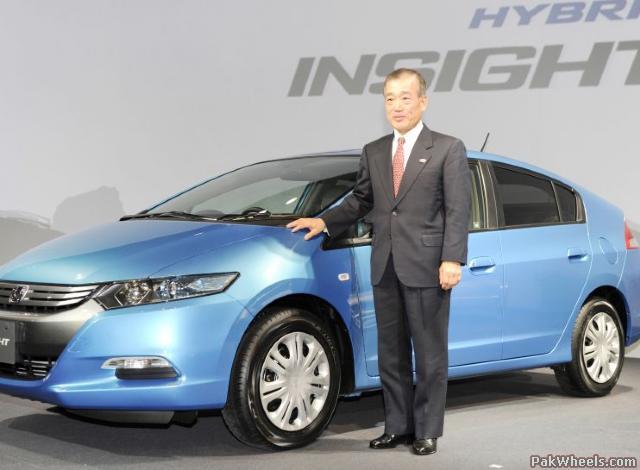HYBRID LEAD KEY AS MARKET SEEN EXPANDING BY 2020
As an engineering student in the 1960's, Takeo Fukui picked the analysis of nitrogen dioxide exhaust emissions as his senior thesis with one goal: joining Honda Motor to get a foothold in the world of motorsport.
He made the cut but, as luck would have it, Honda pulled out of racing that year - 1969. Company founder Soichiro Honda had decided the company should focus instead on improving its engines to clean their exhaust for an increasingly green-minded public.
Now, 40 years later, Fukui leaves behind a similar mandate as he vacates his CEO post this week, having yanked Honda out of F1 six months ago.
And, while auto execs talk about the dawn of a new century of automobiles as petrol-electric hybrid cars enter the mainstream, Fukui says engine technology will remain at the core of Honda's efforts.
"Engines still have a long way to go," he told Reuters. "You can't improve the hybrid system without working on engines."
If Fukui is right, Honda has a good shot at keeping its edge in the global auto industry, at least for the foreseeable future.
Having got its start in post-war Japan by knocking together engines for bicycles, then motorcycles and eventually lawn mowers, generators and cars, Honda is the world's top engine maker by far, producing more than 20-million a year.
It was Honda's CVCC engine that, back in 1974, crowned the Civic as the world's first car to clear emissions standards under the US Clean Air Act on engine performance alone, putting Honda on the map overnight and prompting juggernauts such as Toyota to come knocking on the door for help
.
Experts agree that competitive engines are a prerequisite for developing a good hybrid system.
Takahiro Fujimoto, a manufacturing expert at the University of Tokyo, explained: "Today's competitive hybrid car is 'integral', which requires a delicate balance of engine, electric motor, batteries, power splitter, and the rest of the vehicle.
"That's why it's not as simple as buying the hybrid system and putting it in a car; refining the engine is extremely important."
Staying ahead in the hybrid race will be vital for Honda, which has so far weathered the economic downturn better than rivals with an unbroken string of profits since its founding.!--div[code1]top.DisplayAds('SquareAV',19,819);[/code1]/div--
As fuel economy standards tighten around the world, JP Morgan Securities expects the global hybrid market to expand by 23 times to more than 11-million vehicles in 2020 - 13 percent of vehicle sales.
Pure electric vehicles will take far longer to sell in big numbers, it says.
MORE WORK AHEAD
Still, Honda is not without its Achilles' heel, even in the field of today's internal combustion engines. In many European markets, the regulatory focus on carbon dioxide rather than nitrogen oxide emissions has made diesel cars popular while sidelining petrol-electric hybrids, placing diesel powerhouses such as VW, Peugeot and Renault in pole position.
Honda had planned to launch clean-diesel cars in 2009 but delayed its plans, partly due to the difficulty of reducing costs. The company will also eventually need a different hybrid system because the current version, in the hot-selling new Insight hatchback, has only one electric motor that would be insufficient for a much larger car.
"We had originally planned to use clean-diesel engines on bigger models such as the Accord, CR-V and MDX, so we'll have to come up with something," Fukui said, noting that Honda was working on a two-motor system, among other ideas.
Honda's simple hybrid system is relatively cheap but, unlike Toyota's, is limiting because it cannot be applied to plug-in hybrids, seen as the next phase for fuel-saving cars.
MANY COMBINATIONS
Fukui acknowledges that competition will heat up, hence Honda's surprise exit from F1 in December 2008, but his confidence is palpable as he prepares to pass the baton to the next generation of leaders and engineers.
"In future, hybrid cars will need many types of combinations of transmissions and systems. Iif you look around, there are probably only two manufacturers that develop the transmissions, hybrid systems, and motors all in-house," he said, referring to Honda and Toyota, the only hybrid giants to date.
"In motorcycles, the transmission is inside the engine. It practically IS the engine," said Fukui, whose first assignment at Honda was on the team that developed the CVCC engine.
"That's why, for us, outsourcing the production of transmissions is unthinkable. This is going to be a huge strength for us as hybrids evolve." - Reuters
